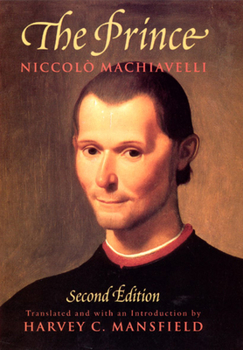The Prince: Second Edition
Select Format
Select Condition 
Book Overview
The most famous book on politics ever written, The Prince remains as lively and shocking today as when it was written almost five hundred years ago. Initially denounced as a collection of sinister maxims and a recommendation of tyranny, it has more recently been defended as the first scientific treatment of politics as it is practiced rather than as it ought to be practiced. Harvey C. Mansfield's brilliant translation of this classic work,...
Format:Paperback
Language:English
ISBN:0226500446
ISBN13:9780226500447
Release Date:September 1998
Publisher:University of Chicago Press
Length:184 Pages
Weight:0.48 lbs.
Dimensions:0.5" x 5.0" x 7.6"
Customer Reviews
6 ratings
Overrated but still worth the read.
Published by Grevius , 5 months ago
The Prince by Machiavelli is a book written in 1513 as a guide for Princes on how to rule either new principalities or old ones. It's an interesting book, but a simple one. As an introductory course on Realpolitik it works well, but most of the things he says you'll already know. He'll also just be wrong at certain times like when he talks about Military Matters that he very clearly doesn't understand. However this book does give insight into the rulers of Renaissance Italy and for that I give it a 7/10.
amazing all over
Published by liz from washington , 3 years ago
machiavelli wrote one of the most influential pieces of literature during the 16th century and i’m proud to say that i’ve read it and enjoyed it.
Prince review
Published by Thriftbooks.com User , 15 years ago
This is a must read for literate thinking persons. I have enjoyed the historical setting introduction to the text. It was a valuable enlightenment into the character of Machiavelli, and the events occureing in the nations during Machiavelli's life. Many of the things he speaks of, a person can see repeated or reflected in politics in our world history in the succeeding centuries since Machiavelli's time. A worthwhile way to use reading time. Highly recommended.
A Simple Book, Yet It Holds The Answers To Politics
Published by Thriftbooks.com User , 16 years ago
Machiavelli's The Prince is one of the classic books to center the ideas of gaining and holding power in political life and what a "Prince" must do to not only accomplish these tasks, but do them successfully. This version of the book is a great copy to use and carry around because Penguin has made this short book into a very small compact size, while not compromising text size and even leaving some room to write in the margins. The book itself is a great book that all students of all disciplines should read, if not for enlightenment in their field, just for the pure gains that a person can take out of this book for life applications. When looking toward politics around the world, many political scientists, politicians, and everyday people alike, use the ideas of Machiavelli and his many simple arguments, knowingly or not. So reading this book will help you not only understand these positions but it will also help you keep yourself in an informed state when debating, voting or just talking all things politics. Machiavelli wrote such a good work that there are numerous single line quotations which a person can take out of this book, and many of them great and true, but to really understand, beyond a few lines of text, the real meaning, one must read the book cover to cover.
The virtues of Machiavelli
Published by Thriftbooks.com User , 19 years ago
In the course of my political science training, I studied at great length the modern idea of realpolitik. In that study I came to realise that it was somewhat incomplete, without the companionship of The Prince, by Niccolo Machiavelli, a Florentine governmental official in the late fifteenth and early sixteenth centuries. The Prince is an oft quoted, oft mis-quoted work, used as the philosophical underpinning for much of what is considered both pragmatic and wrong in politics today. To describe someone as being Machiavellian is to attribute to the person ruthless ambition, craftiness and merciless political tactics. Being believed to be Machiavellian is generally politically incorrect. Being Machiavellian, alas, can often be politically expedient. Machiavelli based his work in The Prince upon his basic understanding of human nature. He held that people are motivated by fear and envy, by novelty, by desire for wealth, power and security, and by a hatred of restriction. In the Italy in which he was writing, democracy was an un-implemented Greek philosophical idea, not a political structure with a history of success; thus, one person's power usually involved the limitation of another person's power in an autocratic way. Machiavelli did not see this as a permanent or natural state of being -- in fact, he felt that, during his age, human nature had been corrupted and reduced from a loftier nobility achieved during the golden ages of Greece and Rome. He decided that it was the corrupting influence of Christianity that had reduced human nature, by its exaltation of meekness, humility, and otherworldliness. Machiavelli has a great admiration for the possible and potential, but finds himself inexorably drawn to the practical, dealing with situations as they are, thus becoming an early champion of realpolitik carried forward into this century by the likes of Kissinger, Thatcher, Nixon, and countless others. One of the innovations of Machiavelli's thought was the recognition that the prince, the leader of the city/state/empire/etc., was nonetheless a human being, and subject to all the human limitations and desires with which all contend. Because the average prince (like the average person) is likely to be focussed upon his own interests, a prince's private interests are generally in opposition to those of his subjects. Fortunate is the kingdom ruled by a virtuous prince, virtue here not defined by Christian or religious tenets, but rather the civic virtue of being able to pursue his own interests without conflicting those of his subjects. Virtue is that which increases power; vice is that which decreases power. These follow Machiavelli's assumptions about human nature. Machiavelli rejected the Platonic idea of a division between what a prince does and what a prince ought to do. The two principle instruments of the prince are force and propaganda, and the prince, in order to increase power (virtue) ought to employ force completely and ruthlessly, a
Power Politics and Diplomacy
Published by Thriftbooks.com User , 23 years ago
Based upon Michiavelli's first hand experience as an emissary of the Florentine Republic to the courts of Europe The Prince analyzes the often violent means by which political power is seized and retained, and the circumstance in which it is lost. Because The Prince is a political commentary, and not a work of fiction, Michiavelli does not use "characters" in the sense of a novel or a short story. Instead he draws his examples from the current political and social events, as well as from history. His characters are the political leaders of his time. The book is a declaration in plain language the conduct of great men and the principles of princely governments. The book can be divided into four sections.1. The types of principalities. Michiavelli lists four types of principalities. * Hereditary principalities, which are inherited by the ruler. * Mixed principalities, territories that are annexed to the rulers existing territories. * New principalities which may be acquired by several methods: by own power, by the power of others by criminal acts or extreme cruelty, or by the will of the people * Ecclesiastical principalities, namely the papal states belonging to the catholic churches.2. The character and behavior of the prince. Michiavelli recommends the following character and behavior for princes: * It is better to be miserly than generous. * It is better to be cruel than merciful. * It is better to break promises if keeping than would be against ones interest. * Princes must avoid making them hated and despised; the goodwill of the people is a better defense than any fortress. * Princes should undertake great projects to enhance their reputation. * Princes should choose wise advisors to confide and consult with3. The types of armies A prince must always pay close attention to military affairs if he wants to remain in power. A prince must lay good foundation and those foundations include good laws and good armies. There cannot be good laws without good armies, and where there are good laws there must be good armies. The study of war should be a prince's main goal, for war is a rulers only art.If princes become too refined to study this art they loose their state. The types of armies are: * Mercenaries or Auxiliaries (loaned to you by another ruler) are both dangerous and unreliable, as they will maintain their interests preceding yours. * Native troops composed of ones own citizens or subjects are by far the most desirable kind. 4. Italy's political situation Michiavelli outlines and recommends the following * The rulers of Italy have lost their states by ignoring the political and military principles. * Fortune controls half of human affairs, but free will controls the rest, leaving the prince free to act. However, the f
De Principatibus / Il Principe Mentions in Our Blog

In the Game of Life, Play Chess, Not Checkers
Published by William Shelton • December 08, 2020
For people unfamiliar with the game of chess, they can often be intimidated or bored by the prospect of trying it, but we know more about the game than we recognize, and we often "play" the game more than we realize. Luckily, the rules and strategies have been covered by several experts in books, and beyond that, the elements of the game can be understood through literature like that of Machiavelli. Learn more about this fascinating game with these book picks.







